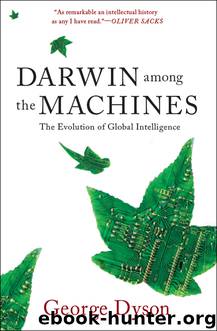Darwin Among the Machines by George B. Dyson

Author:George B. Dyson [Dyson, George]
Language: eng
Format: epub, mobi
Publisher: Basic Books
9
THEORY OF GAMES AND ECONOMIC BEHAVIOR
The game that nature seems to be playing is difficult to formulate. When different species compete, one knows how to define a loss: when one species dies out altogether, it loses, obviously. The defining win, however, is much more difficult because many coexist and will presumably for an infinite time; and yet the humans in some sense consider themselves far ahead of the chicken, which will also be allowed to go on to infinity.
—STANISLAW ULAM1
“Unifications of fields which were formerly divided and far apart,” counseled John von Neumann in 1944, “are rare and happen only after each field has been thoroughly explored.”2 So went his introduction (with Oskar Morgenstern) to Theory of Games and Economic Behavior, a mathematical vision whose brilliance was eclipsed only by the developments that his work in atomic weapons and digital computers was about to bring to light.
An interest in economics ran deeply through von Neumann’s life. At the time of the Institute for Advanced Study’s electronic computer project, von Neumann maintained an incongruous appearance, wearing a three-piece suit among casually dressed logicians and electrical engineers. This costume was a memento of his background as the son of an investment banker and the omen of a future in which the world of money and the world of logic, thanks to computers, would meet on equal terms. In his Theory of Games and Economic Behavior, von Neumann laid the foundations for a unified view of information theory, economics, evolution, and intelligence, whose implications continue to emerge.
Among von Neumann’s predecessors was André-Marie Ampère, who published Considérations sur la théorie mathématique du jeu (On the mathematical theory of games) at the age of twenty-seven in 1802. Ampère began his study by crediting Georges Louis Buffon (“an author in whom even errors bear the imprint of genius”) as the forefather of mathematical game theory, citing his (1777) Essai d’ Arithmétique Morale. Buffon (1707–1788) was a celebrated naturalist whose evolutionary theories preceded both Charles and Erasmus Darwin, advancing ideas that were risky at the time. “Buffon managed, albeit in a somewhat scattered fashion,” wrote Loren Eiseley, “at least to mention every significant ingredient which was to be incorporated into Darwin’s great synthesis of 1859.”3 The elder Buffon and the young Ampère shared in the tragedy that swept postrevolutionary France: Button’s son and Ampère’s father both died under the guillotine, equally innocent of any crime.
Ampère analyzed the effects of probability rather than strategy, ignoring more deliberate collusion among the players of a game. Having suffered the first of a series of misfortunes that would follow him through life, Ampère saw games of chance as “certain ruin” to those who played indefinitely or indiscriminately against multiple opponents, “who must then be considered as a single opponent whose fortune is infinite.”4 He observed that a zero-sum game (where one player’s loss equals the other players’ gain) will always favor the wealthier player, who has the advantage of being able to stay longer in the game.
Von Neumann’s initial contribution to the theory of games, extending the work of Émile Borel, was published in 1928.
Download
This site does not store any files on its server. We only index and link to content provided by other sites. Please contact the content providers to delete copyright contents if any and email us, we'll remove relevant links or contents immediately.
| Computer Vision & Pattern Recognition | Expert Systems |
| Intelligence & Semantics | Machine Theory |
| Natural Language Processing | Neural Networks |
Algorithms of the Intelligent Web by Haralambos Marmanis;Dmitry Babenko(7845)
Hadoop in Practice by Alex Holmes(5656)
Jquery UI in Action : Master the concepts Of Jquery UI: A Step By Step Approach by ANMOL GOYAL(5509)
Life 3.0: Being Human in the Age of Artificial Intelligence by Tegmark Max(4492)
Functional Programming in JavaScript by Mantyla Dan(3718)
The Age of Surveillance Capitalism by Shoshana Zuboff(3411)
Big Data Analysis with Python by Ivan Marin(2961)
Blockchain Basics by Daniel Drescher(2883)
The Rosie Effect by Graeme Simsion(2704)
WordPress Plugin Development Cookbook by Yannick Lefebvre(2578)
Hands-On Machine Learning for Algorithmic Trading by Stefan Jansen(2488)
Applied Predictive Modeling by Max Kuhn & Kjell Johnson(2474)
Dawn of the New Everything by Jaron Lanier(2433)
The Art Of Deception by Kevin Mitnick(2292)
Test-Driven Development with Java by Alan Mellor(2281)
Rapid Viz: A New Method for the Rapid Visualization of Ideas by Kurt Hanks & Larry Belliston(2189)
Human Dynamics Research in Smart and Connected Communities by Shih-Lung Shaw & Daniel Sui(2173)
Once Upon an Algorithm by Martin Erwig(2141)
The Infinite Retina by Robert Scoble Irena Cronin(2126)
